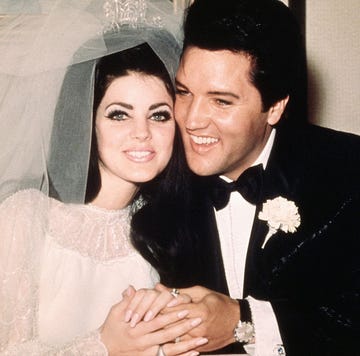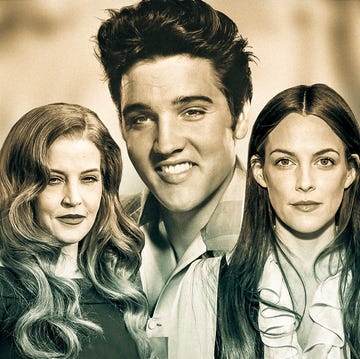In recent years, Bruce Springsteen has made peace with his often tumultuous relationship with his father, Douglas “Dutch” Springsteen. Whether at his concerts, throughout his Broadway residency, or in his memoir, Born to Run, he sums up the fraught familial dynamic with a succinct and distinctly Springsteen line:
“My father was my hero and my greatest foe.”
In the new biopic, Springsteen: Deliver Me From Nowhere, the tension between father and son is central to the story. The Bear’s Jeremy Allen White takes on the role of adult Bruce Springsteen, while recent Emmy winner Stephen Graham steps into the role of his father, Dutch.
Many of Springsteen’s lyrics reflect a fraught relationship with his father
Of course, longtime Springsteen fans have already witnessed the musical artist they affectionately call “The Boss” wrestle with his feelings toward his father, which has played out across some of Springsteen’s most celebrated records. The brutally rage-filled “Adam Raised a Cain” from 1978’s Darkness on the Edge of Town gave way to lines like “Papa, now I know the things you wanted that you could not say,” on the track “Independence Day” from 1980’s The River. A mournful yearning for reconciliation can be heard on Nebraska’s 1982 song “My Father’s House.”
“Our actual relationship was probably more complicated than how I presented it,” Springsteen would say in a 2010 retrospective on Darkness on the Edge of Town for Rolling Stone. “Those songs were ways that I spoke to my father at the time, because he didn’t speak and we didn’t talk very much.”
Decades of music provided the emotional overview of Springsteen’s struggle for acceptance from—and of—his tormented father. His lyrics spoke of a generational conflict his listeners could connect with: a father who grew up amongst the chaos and haze of the second World War and felt achieving the “American Dream” of prosperity and stability relied on conformity. Springsteen sings of his role as a son who saw stability as stagnation, “a death trap, it’s a suicide rap,” as he sings on “Born to Run,” from which he had to escape to pursue his own dreams.
Bruce’s father insisted he get a haircut to be seen by a doctor
Several incidents are chronicled in the memoir Born to Run where Dutch reacts to Bruce’s rebellious self-expression, concerned his son didn’t “fit in” and could embarrass him. Springsteen’s motorcycle accident at age 17 is most emblematic.
In the 1960s, Bruce was sporting long hair like many young rockers of the time, a trend looked down upon by the older people in his New Jersey home. Dutch forcefully insisted his son get a haircut before he was seen by doctors for injuries resulting from a motorcycle accident he’d recently suffered. Though Dutch’s stated argument was concern that the doctors would refuse to treat him if he arrived there with long hair, beneath the surface there was another implication of Dutch’s distaste for his son’s chosen hairstyle.
“I think the nearest thing would be when the punk revolution hit and the kids with the mohawks, that was the last time you could physically distinguish yourself as part of a new philosophy,” Bruce told BBC Radio 2 to contextualize the parental panic over long hair in his youth.
Therapy helped Bruce accept his relationship with his father
In his 2016 autography, Bruce shared many personal anecdotes about struggles he experienced growing up. Dutch’s mistreatment of Springsteen was due in part to a long family history of depression and mental health struggles—he battled serious depression and heavy alcoholism most of his life. “As a boy, I figured it was just the way men were, distant, uncommunicative, busy with the currents of the grown-up world,” he wrote.
After Bruce experienced what he called a “pretty good breakdown,” he feared falling into the same traps and sought professional help when he was in his 30s.
It was through therapy that Bruce was able to come to grips, not just with his father’s treatment of him, but how their relationship reflected the experience of fathers and sons that echoes through time. As he puts it in Born to Run, “We honor our parents by carrying their best forward and lay the rest down. By fighting and taming the demons that laid them low and now reside in us.”
Eventually, Bruce himself ventured into fatherhood. With the 1990 birth of his first son, Evan, with wife Patti Scialfa, an opportunity came for Dutch to have a small reconciliation with his own son.
Bruce recalls a visit from his father, now reflective on his new role as Evan’s grandfather. The oftentimes distant Dutch decided to make a spontaneous drive to see his son and grandson, driving 400 miles to Bruce’s home. Once there, the two spoke over some beers. At one point amidst that haze, Dutch spoke frankly to Bruce. “Bruce, you’ve been very good to us,” he told his son. “And I wasn’t very good to you.”
Bruce was never able to get his father to say the words “I love you” (the most he could elicit, he says, was an “Eh, me too”), but in his memoir, he cites a small moment with Dutch over beers, an admission that “I wasn’t very good to you,” was all he really needed to hear from his father, he told Vanity Fair.
See Springsteen: Deliver Me from Nowhere starting October 24
Springsteen: Deliver Me from Nowhere debuts in theaters Friday, October 24. See White as Bruce and Graham as Douglas alongside Gaby Hoffman as Springsteen’s mother Adele, Emmy-winner Jeremy Strong as manager Jon Landau, and Odessa Young as fictional love interest Faye Romano.
Michale Natale is a News Editor for the Hearst Enthusiast Group. As a writer and researcher, he has produced written and audio-visual content for more than fifteen years, spanning historical periods from the dawn of early man to the Golden Age of Hollywood. His stories for the Enthusiast Group have involved coordinating with organizations like the National Parks Service and the Secret Service, and travelling to notable historical sites and archaeological digs, from excavations of America’ earliest colonies to the former homes of Edgar Allan Poe.















